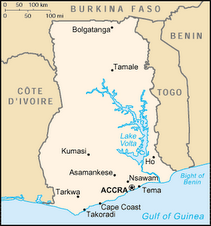I was saddened by the death of a twenty-two year old young man from septic shock which resulted from a toothache. The young man started with a toothache one month ago and sought local village treatment. One week later he developed swelling of the jaw, face and neck, confusion and became irrational. His family continued with the local treatment. Cultural belief has it that swellings are not to be drained or injected. Eventually, he was brought to the hospital and I was called to possibly do a tracheotomy. However, this previously healthy young man was already in septic shock with the whole side of his face and neck filled with exudates; he was feverish, anureic, hypotensive and tachypneic. The abscesses were drained of thick brown pus, but the boy stopped breathing later that evening never responding to fluids and antibiotics. Many families do not bring their sick to the hospital because of cost. The hospital visit fee is $4 while they earn $2 daily. Cost for admission and surgery is between $200 and $300 which is well beyond their financial means. Many patients are brought in moribund and many die on the way. Of those admitted, fifty percent die within the first twenty-four hours, not giving us enough time to treat them.
Hopefully, a better outcome will occur with a 16 month old boy who was recently referred from a hundred miles away because of runny nose and upper respiratory infections of four months duration. The child was examined for nasal foreign bodies, syphilis and aids, all being negative. Because of his poor condition, he was referred to our excellent pediatrician, who questioned why a child with a runny nose was being referred from an ear, nose and throat doctor. After I explained the results of my work-up, he said he would get back to me and returned later stating the child had malnutrition, being less than one percent of normal weight, with multiple lymph nodes probably due to tuberculosis. He admitted the child to the hospital to be fed and treated. Although TB, pneumonia and diarrhea are listed as the cause of childhood deaths, the real cause sixty percent of the time is underlying malnutrition which makes the children more susceptible and results in fatal outcomes because their resistance is so low.
It is a joy to work with the young, intelligent, dedicated Ghanaian physicians and to see the improvement in the care of the patients.
Sunday, January 31, 2010
Sunday, January 24, 2010
Tamale Teaching Hospital is a good hospital
Tamale Teaching Hospital is a good hospital. Newly appointed and recently trained physicians, pharmacists, laboratory technicians and administrative professionals have improved patient care. The new graduates are dedicated, knowledgeable and hard working. They are capable of working in the most sophisticated medical settings with the proper orientation and training. Their lectures at the hospital clinical meeting are excellent. Medications and bandages are available through the persistent efforts of the new caring, hard working and honest administrators. However, the staff is limited by the lack of equipment. In the hospital there is one electrocardiographic machine, three ward oximeters, no vaporizers or intravenous infusions pumps. Our otolaryngology clinic is lacking a pediatric nasopharyngoscope and bronchoscopes, laser, rigid telescopes for sinus surgery and suction debriders for nasal polypectomies. “One looks for what is needed and then one uses what is found” and “We are managing” are the appropriate practical Ghanaian sayings in response to this lack of equipment. Six Columbia St.Lukes/Roosevelt ultrasound physicians and public health professionals, under a General Electric grant, gave an excellent two day ultrasound workshop. Ultrasoundography is inexpensive, non-invasive and without complications. Two ultrasound machines were donated, which are appreciated, but thirty are needed along with maintenance for the five millions patients in northern Ghana. All is not Utopia. Human nature is universal and there are those who do not work when necessary, saying they are underpaid. But, we are managing.
Subscribe to:
Posts (Atom)

